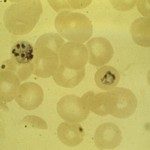Lien vers Pubmed [PMID] – 35249546
Lien DOI – 10.1186/s12916-022-02265-9
BMC Med 2022 Mar; 20(1): 85
Plasmodium falciparum malaria is associated with anaemia-related morbidity, attributable to host, parasite and drug factors. We quantified the haematological response following treatment of uncomplicated P. falciparum malaria to identify the factors associated with malarial anaemia.Individual patient data from eligible antimalarial efficacy studies of uncomplicated P. falciparum malaria, available through the WorldWide Antimalarial Resistance Network data repository prior to August 2015, were pooled using standardised methodology. The haematological response over time was quantified using a multivariable linear mixed effects model with nonlinear terms for time, and the model was then used to estimate the mean haemoglobin at day of nadir and day 7. Multivariable logistic regression quantified risk factors for moderately severe anaemia (haemoglobin < 7 g/dL) at day 0, day 3 and day 7 as well as a fractional fall ≥ 25% at day 3 and day 7.A total of 70,226 patients, recruited into 200 studies between 1991 and 2013, were included in the analysis: 50,859 (72.4%) enrolled in Africa, 18,451 (26.3%) in Asia and 916 (1.3%) in South America. The median haemoglobin concentration at presentation was 9.9 g/dL (range 5.0-19.7 g/dL) in Africa, 11.6 g/dL (range 5.0-20.0 g/dL) in Asia and 12.3 g/dL (range 6.9-17.9 g/dL) in South America. Moderately severe anaemia (Hb < 7g/dl) was present in 8.4% (4284/50,859) of patients from Africa, 3.3% (606/18,451) from Asia and 0.1% (1/916) from South America. The nadir haemoglobin occurred on day 2 post treatment with a mean fall from baseline of 0.57 g/dL in Africa and 1.13 g/dL in Asia. Independent risk factors for moderately severe anaemia on day 7, in both Africa and Asia, included moderately severe anaemia at baseline (adjusted odds ratio (AOR) = 16.10 and AOR = 23.00, respectively), young age (age < 1 compared to ≥ 12 years AOR = 12.81 and AOR = 6.79, respectively), high parasitaemia (AOR = 1.78 and AOR = 1.58, respectively) and delayed parasite clearance (AOR = 2.44 and AOR = 2.59, respectively). In Asia, patients treated with an artemisinin-based regimen were at significantly greater risk of moderately severe anaemia on day 7 compared to those treated with a non-artemisinin-based regimen (AOR = 2.06 [95%CI 1.39-3.05], p < 0.001).In patients with uncomplicated P. falciparum malaria, the nadir haemoglobin occurs 2 days after starting treatment. Although artemisinin-based treatments increase the rate of parasite clearance, in Asia they are associated with a greater risk of anaemia during recovery.

